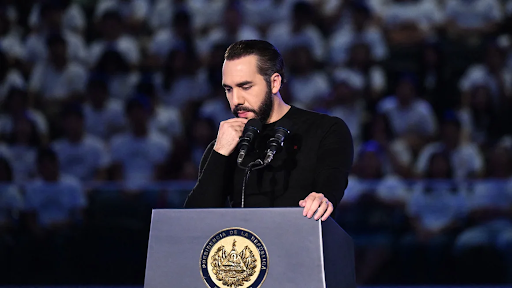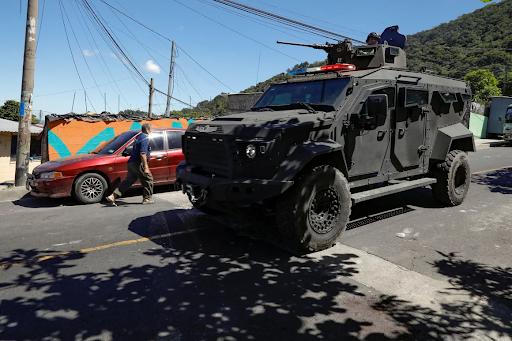El Salvador's Nayib Bukele delivers a speech to high school students at the Adolfo Pineda National Gymnasium in San Salvador. Copyright © BDCNnews. All Rights Reserved.
We offer a thorough analysis of President Nayib Bukele's rise to power, his controversial "iron fist" strategy against gangs, and the expanding authoritarian measures eroding El Salvador’s democratic institutions—all while maintaining an unusually high public approval rating.
🔐 1. "Iron Fist" Strategy: Crime Reduction by Any Means
Unprecedented Gang Crackdown
In March 2022, following a surge that saw over 80 murders in a single weekend, Bukele declared a state of exception, suspending constitutional rights to root out gangs MS‑13 and Barrio 18 elpais.com+15en.wikipedia.org+15time.com+15. He deployed tens of thousands of police and military to effect massive arrests.
-
Over 85,000 detentions of alleged gang members as of March 2025
-
Homicide rate fell from 17 per 100,000 in 2021 to 7.8 in 2022, dropping further to 2.3 in 2023—and estimated 1.6 in 2024
-
Incarceration rate now exceeds 1.7% of the population—the highest globally
Terrorism Confinement Center (CECOT)
Opened in 2023, CECOT is a "mega‑prison" designed to hold 40,000 inmates. Bukele promotes it as a symbol of his hardline policy, yet journalists and observers have raised alarm over human rights concerns.
🏛 2. Institutional Erosion and Democratic Decline
Judicial and Legislative Capture
-
Troops sent into Congress (2020) to intimidate lawmakers resisting his budget
-
Purge of Supreme Court and Attorney General (2021), enabling controversial rulings like permitting Bukele's re‑election.
Re‑election Controversy
Constitution prohibits immediate re‑election. Court-packed judges declared it permissible; Bukele won a landslide with 84% of the vote
📰 3. Suppression of Civil Liberties and Dissent
Mass Detentions Beyond Gang Suspects
-
Arrests extended to ordinary citizens—from DUI offenders to activists—without due process
-
Human rights defenders like Ruth López detained secretly, denied judicial review, prompting international legal action
Press Freedom Crushed
-
Investigative journalists from El Faro forced into exile amid raids, surveillance, and intimidation
-
Security Minister Gustavo Villatoro openly denounces and monitors press deemed "pro‑gang"
Foreign Agent Law
Legislation now taxes foreign-funded NGOs and media at 30%, granting Bukele’s administration broad authority to revoke licenses and impose sanctions
📊 4. Public Support vs. Authoritarian Costs
High Approval Amidbacksliding
Despite democratic erosion, Bukele’s approval remains between 80–90% Citizens credit him for stability and safety—even as 61% admit fear of public dissent.
Economic and Governance Risks
Public debt has surged to 84% of GDP, fueled partly by Bitcoin investments and mega‑infrastructure projects funded through Chinese loans. Critics project that fiscal fragility may eventually undermine Bukele’s popularity
A prison officer stands guard in the watchtower at CECOT (Center for the Compulsory Housing of Terrorism) in Tecoluca, San Vicente, El Salvador.Copyright © BDCNnews. All Rights Reserved.
📈 5. Regional and Global Ripple Effects
Authoritarian Playbook Exported
Bukele’s decade-long model is inspiring leaders in Guatemala, Honduras, Ecuador, Peru, Argentina, and beyond . U.S. figures such as Matt Gaetz and Trump have praised Bukele’s methods.
U.S.–Bukele Relations
From sanctions in 2021 to diplomatic recalibration by 2025: Homeland Security Secretary Mayorkas attended Bukele’s inauguration, signaling Washington’s uneasy acceptance . However, concerns over democratic rollback persist.
🧠 6. Bukele’s Evolution: From Populist Outsider to Strongman
Media Mastery
A former publicist turned savvy politician, Bukele leveraged social media for his early public building projects and national campaigns. He proudly adopted the moniker “world’s coolest dictator” to challenge critics
Strategic Rebranding through Bitcoin
In 2021, El Salvador became first country to adopt Bitcoin as legal tender. Popularity among crypto‑enthusiasts rose, though mass adoption stalled (<12% usage) . This served more as global marketing and image repositioning.



